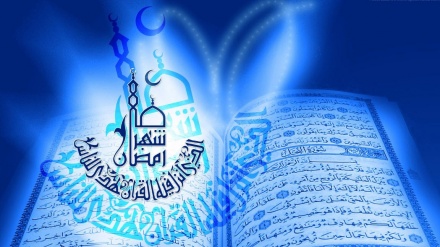Blessed Month of Ramadhan
Welcome to the 8th episode of the series “Blessed Month of Ramadhan”. May God Almighty accept your prayers, fasting and all other acts of worship!
On the 8th day of the blessed month of Ramadhan, we begin today’s discussion. Psychologists note that human beings maintain several capacities for receipt of love and kindness. Negligence of each of these capacities generates concerns and shortcomings within us. The most important of these capacities, is the one which is filled with love of God, shaping a positive feeling coupled with peace of mind within us.
German psychologist, Erich Fromm, wrote: The assumption was that public welfare and comfort brings about joy and peace of mind. Unrestricted production; absolute freedom; and astounding progresses were imagined to be able to replace Heaven with the material world. However, the fact of the matter is that the industrialization era failed to deliver on its pledge and people have increasingly come to realize that uninhibited satisfaction of whims is not the path which would lead to peace of mind and happiness of mankind.
The 1952 Nobel Peace Laureate, German physician, Albert Schweitzer, addressing the international community, at the corresponding ceremony, noted that human has turned into superman, but without achieving a superior mindset. The further the power of mankind, the shakier creature he becomes; and this fact should shake our conscious.
Meanwhile, in the view of Source of life, Who has created the whole universe including the best of creation, mankind, and is perfectly aware of the human beings’ pains, remedies, and characteristics, even thoughts that flash across the mind; peace of mind is only achieved via remembrance of God and establishment of a bond with the One and Only Loving Creator. In ayah 28 of Surat ar-Ra’d, God says:
“…Look! The hearts find rest in Allah’s remembrance…”
The Iranian Gnostic and famous Persian poet, Mowlana Jalal od-Din Roumi, says in his celebrated work “Mathnavi”: “There is an insatiable desire in mankind that does not come to rest even if one owns a hundred thousand worlds. In whatever profession persons are engaged, and irrespective of the high posts they hold, or sciences they learn such as philosophy, astronomy, medicine, and so forth, they do not attain peace of mind because they have failed to recognize the real goal, that is, proper cognizance of God Almighty. This is why God Almighty says in the holy Qur’an “The hearts find rest in Allah’s remembrance.” Thus, how lucky are the ones who are awakened sooner, as a result of which the long righteous path is shortened for them, since they do not waste their time in the vain pursuit of aimless worldly desires.”
God Almighty says in Ayah 64 of Surat an-Nisa in Holy Qur’an:
“We did not send any prophet but to be obeyed by Allah’s leave. Had they (the people), when they wronged themselves, come to you and pleaded to Allah for forgiveness, and the Prophet had pleaded for forgiveness for them, they would have surely found Allah All-Clement, All-Merciful.”
As is clear by the wordings of this ayah, the mercy of God is infinite, and He is ready to forgive all those who repent of their foul deeds and seek forgiveness. The Prophets guide people toward the merited human growth and perfection. This ayah thus leaves the option open for sinners to return to the righteous path. Meanwhile, the interesting point in this ayah is that instead of saying they disobeyed God, it says that when they wronged themselves. This means that those who have neglected the instructions of God and the Prophet, have in fact wronged themselves, given that divine instructions serve human interests, and whoever neglects these instructions has in fact ruined the foundation of his/her own life. Furthermore, this ayah is a response to retarded minds, such as the Wahhabi heretics, who baselessly regard intercession with the Prophet of Islam as a type of polytheism. This ayah points out that approaching the Prophet of Islam, and seeking his intercession has been permitted by God Himself, and is effective for sinners, since it leads to acceptance of one’s repentance and one’s forgiveness by God the All-Merciful.
Now, if seeking the Prophet’s intercession is alleged to be tantamount to polytheism, how come Holy Qur’an instructs sinners to do so? Sinners should first repent and end their wrongdoings and then seek the Prophet’s intercession for acceptance of their repentance in the Divine Court. Meanwhile, the interesting point is that Holy Qur’an states that the Prophet shall plead for forgiveness of sinners. This shows that the Prophet of Islam can make use of his elevated status before God to plead for divine forgiveness of the repenting wrongdoers.
Now, let’s pay attention to medical recommendations for the blessed month of Ramadhan. One of our listeners, Ms. Salehi of Iran points out: “I like fasting. The spiritual atmosphere of this sacred month is admirable. However, when I fast, I feel weak, making me concerned that I may not be able to complete this act of worship.”
We remind Ms. Salehi and others, who may share her concerns, that: Fasting throughout warm days is different to fasting in other seasons. You swiftly become thirsty, and if you work, your energy is drained throughout the day. Experts recommend that in order to lower the pressure of hunger and thirst in the blessed month of Ramadhan, always include Sahari the late midnight meal before beginning of the day’s fast. Otherwise, you will not receive adequate carbohydrates in the long term; your blood sugar falls; you experience a headache, and your blood pressure plummets. Eating Sahari reduces the difficulty of those, who fast. Thus it is good for the person who fasts, to wake up at the break of dawn and to eat a meal, even if it is only a date and a glass of water. Eating meals filled with proteins for Sahari remedies the possible sense of weakness due to hunger. Eating sugary food, such as jams and syrups, for Sahari is not recommended. Such meals quickly raise blood sugar, and cause the secretion of insulin in body in the morning. Sufficient consumption of vegetables, such as lettuce, can prevent thirst throughout the day.
Iranian nutritionist, Mr. Haji Faraji, notes: “Sahari is one of the most important meals, in which appropriate consumption of vegetables and starchy food can control absorption and digestion of food within intestines. This is because usually fibers such as vegetables and fruits highly contribute to provision of water for the bodies of those who fast. In the blessed month of Ramadhan, those who fast should include low-fat proteins in their dietary regimen, and should avoid fatty, fried foods in this blessed month, because fatty, fried foods drain one’s energy. It is better to consume boiled foods in the blessed month.”
MR/AS/SS


